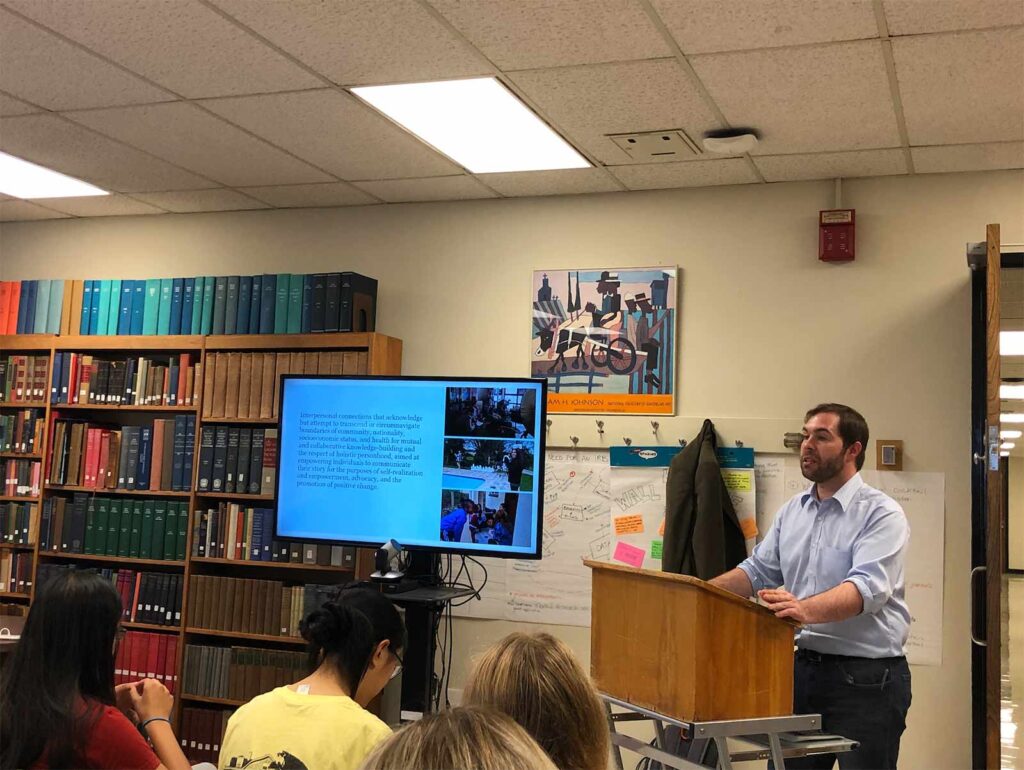 So what did you do last summer? For Paul Blom, PhD student in the Department of English and Comparative Literature, this question opens up a discussion on health, representation, art, human connection and so much more. On October 2nd, Blom presented to a packed room of UNC students, HHIVE members, and general audience about a summer study abroad course he co-teaches with Jonathan Smith at Yale in an enthralling multidimensional fashion. The course takes around 10-20 students to South Africa and Eswatini (formerly known as Swaziland) and challenges them to portray a lived condition through visual storytelling while also engaging the local population in an ethical and genuine way.
So what did you do last summer? For Paul Blom, PhD student in the Department of English and Comparative Literature, this question opens up a discussion on health, representation, art, human connection and so much more. On October 2nd, Blom presented to a packed room of UNC students, HHIVE members, and general audience about a summer study abroad course he co-teaches with Jonathan Smith at Yale in an enthralling multidimensional fashion. The course takes around 10-20 students to South Africa and Eswatini (formerly known as Swaziland) and challenges them to portray a lived condition through visual storytelling while also engaging the local population in an ethical and genuine way.
The idea for the course arose from a project Smith began years ago called “They Go to Die” in which he created a documentary to express the poor living and working conditions of many South African miners in an effort to engage a broader audience. Most of us do not know what it’s like “to have a machete taken to our lungs” as poet and Harvard Educated PhD student Clint Smith describes in the poem, “Welcome to the Mines,” that he wrote and performed for the project. In the film, Jonathan Smith highlights the “consequences of corporate indifference” that have condemned men to dangerous environments in an effort to feed their families. The method of putting research into videos enhances the power of storytelling in the context of health issues and allows those typically distanced from the health field to understand the lives of those across the globe.
When Blom and Smith’s students arrive in South Africa, they are reminded that patients are the experts of their condition and to emphathize their personhood. Over the years, Blom and Smith have become friends with those they visit year after year, and have been invited to weddings, parties, and the dinner tables of people they work with. Blom fondly remembers learning traditional dances as much as he recalls the actual studies he completes. Many of the projects center around the lives of the people with the conditions and rather than the conditions themselves.
Throughout the presentation, Blom played clips from students’ past projects, including one in which patients discuss the stigmatization of HIV/AIDS. The clip showed the first man to publicly disclose his health status as HIV positive, Vusi Matsebula, and how he transformed his life from a mentality of “kissing his dreams goodbye” to one of social and cultural change, including advocacy for those affected.
Upon return to the United States, Bloom makes sure to tell his stories in a way that shows the autonomy and agency of the people he has learned from. By giving talks such as these, he humanizes the many people who are often relegated to the status of “other.” As a TA in the medicine, literature, and culture program and a PhD student in English and Comparative Literature, Blom will continue to progress in the field of health humanities and show others how lived conditions can be portrayed in new and innovative ways. So I think the better question is, what do you want to do next summer?
Kate Capitano is a junior majoring in Global Studies. Her concentration is Public Health and Environment with Latin America as the area of study. She is also on the pre-med track and hopes to combine the two through the Medicine, Literature, and Culture Minor. Specifically interested in women’s rights and health, Kate hopes of one day becoming an OBGYN.


